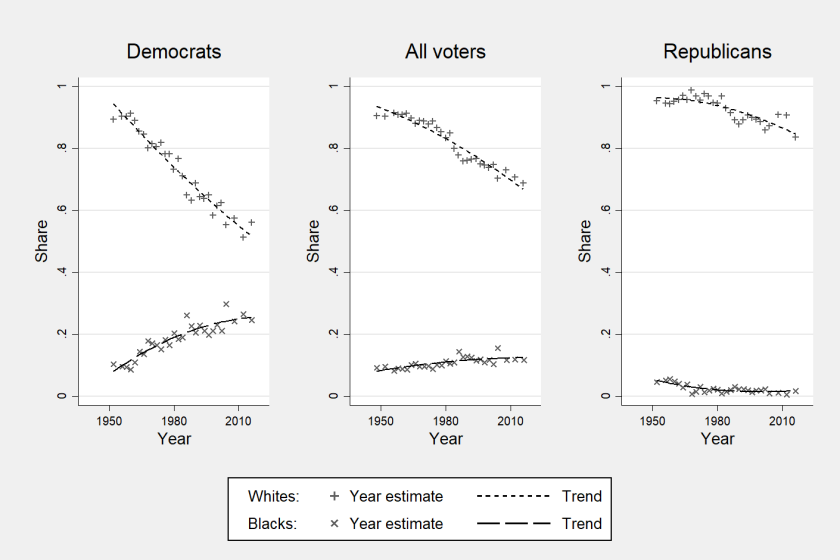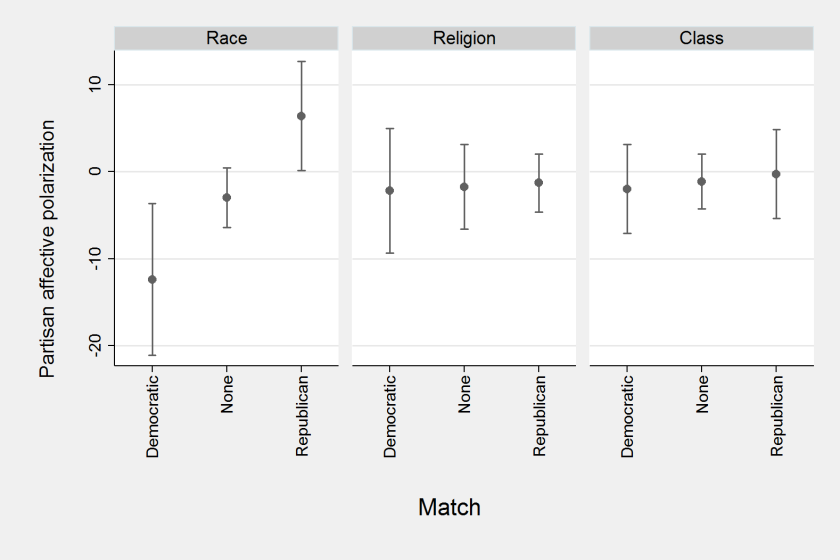By Nicholas A. Valentino and Kirill Zhirkov
[youtube https://www.youtube.com/watch?v=XFMTdNxp57k]
Affective polarization – the mutual partisan antipathy expressed by both Democrats and Republicans in the U.S. – has increased dramatically over the last 30 years. Both real-life political processes and their reflections in social media offer anecdotal evidence for this conjecture, as demonstrated by declining civility in political debates. Systematic evidence for this disturbing trend also comes from the ANES time series, as documented by Iyengar, Sood, and Lelkes (2012).
What are the root causes of this process? One of the most influential approaches to affective polarization emphasizes the changing social compositions of the two parties (Mason 2018). Over the last decades, sorting rendered Democrats and Republicans relatively homogeneous and distinct on a number of non-ideological dimensions, from religious affiliation to place of residence. For example, whereas both conservatives, moderates, and even some liberals once identified with the Republican party, now the vast majority are conservative. While Democrats once included highly religious as well as secular adherents, most fundamentalists have now departed for the Republicans.
However, we think another dimension is most important. Race/ethnicity now cleaves the parties more neatly than ever, and not simply because Democrats and Republicans disagree in their attitudes about race itself. In fact, whites are sorting out of the Democratic party at a significant rate while minorities are standing pat. Figure 1 presents evidence in this regard using the American National Election Studies time-series data starting from 1952. The growing racial gap between the two parties is evident. As the share of Whites among self-identified Democrats is rapidly decreasing (outpacing demographic changes in the country as a whole), the Republican Party remains overwhelmingly White. Our conjecture is that it is these changes in race and ethnicity that drive most of the affective polarization we have witnessed over the last 30 years.

If we are correct we would expect that American voters have begun to develop much more highly racialized mental images of political parties. Furthermore, these racialized images should be much more politically consequential than partisan schemas linked to religion, class, or other dimensions.
To explore this possibility, we conducted two survey studies based on interviews with Amazon’s Mechanical Turk (MTurk) workers. In the first study, we relied on implicit methods to measure respondents’ associations between the two major parties on the one hand and Blacks and Whites on the other hand. Specifically, we used a timed image sorting task similar in architecture to the well-known implicit association test (IAT). However, unlike the standard IAT our task did not include an affective component – instead, it simply measured the strength of associations between racial and partisan groups via objective reaction times (transformed into the IAT D-scores according to the respective guidelines).
Figure 2 presents the results. On average, respondents’ racialized schemas about partisan coalitions were consequential. White respondents who thought of the Democratic Party as Black reported clear affective preference for the Republican Party. Furthermore, this effect was moderated by racial resentment: racialized schemas about the two parties were consequential for those high in racial resentment but not for the racially liberal respondents.

In the second study, we asked explicit questions about supporters of the two parties. Specifically, we wanted our respondents to tell us their best guess about the race/ethnicity of “the typical Democrat/Republican.” We found that even in the MTurk sample, which is known to be more liberal than the U.S. general population, as much as 25% of respondents thought of the modal Democratic voter as Black or African American. This is clearly a misperception: even though the Democratic Party indeed draws a substantial share of its electoral support from minority groups, Whites still comprise the plurality of Democratic supporters.
As with implicit schemas, explicit ones were politically consequential. Even controlling for issue positions and demographics, respondents who perceived themselves to “match” with one of the two parties in terms of race exhibited significantly more polarized partisan feelings than those who did not feel they matched one or both of the parties in terms of race. Moreover, partisan identity matching with other groups, namely religious denomination and social class, had almost no effect on affective polarization. Results are presented in Figure 3.

Our findings have important implications for the study of affective polarization and for the subfield of American political behavior more generally. We suspect that Americans now see the partisan coalitions in racial terms and that these racialized images are highly consequential for how people feel toward the parties. In comparative politics, the “ethnicization” of political parties is associated with a host of negative system-level outcomes, such as bad governance and political instability. If the process that we highlight continues, the American political system may experience problems much worse than Twitter brawls between fans of Rachel Maddow and Sean Hannity.
About the Authors: Nicholas A. Valentino is a Research Professor at the Center for Political Studies and a Professor in the Departments of Political Science and Communication Studies at the University of Michigan. Kirill Zhirkov is a PhD student in the Department of Political Science at the University of Michigan. Valentino and Zhirkov received the Best Paper in Political Behavior award for their study “The Images in Our Heads: Race, Partisanship and Affective Polarization” presented at the 2017 MPSA conference.
References
Iyengar, Shanto, Gaurav Sood, and Yphtach Lelkes. 2012. “Affect, not Ideology: A Social Identity Perspective on Polarization.” Public Opinion Quarterly 76 (3): 405–31.
Mason, Lilliana. 2018. Uncivil Agreement: How Politics Became Our Identity. Chicago: University of Chicago Press.
